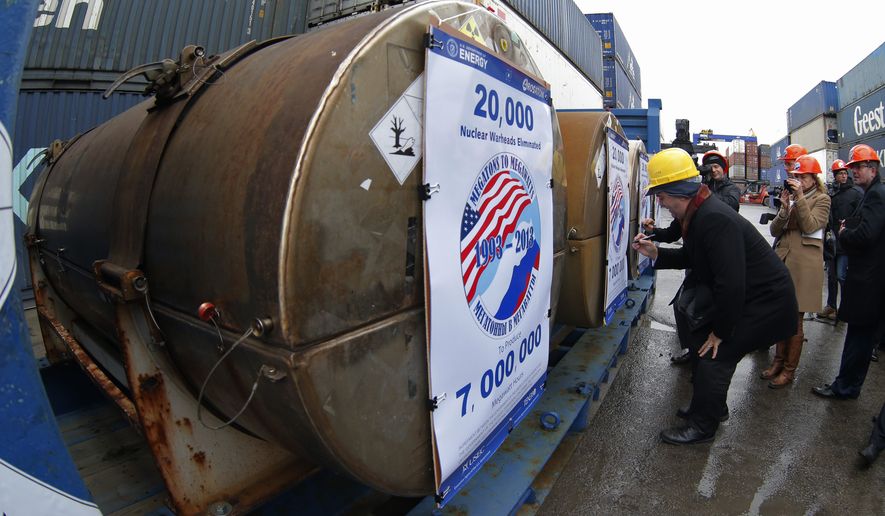A FBI informant who gave the government information about a Russian bribery plot implicated in the sale of U.S. uranium rights tried unsuccessfully last year to recover upwards of $700,000 in bribes he said he was authorized to pay as part of the FBI investigation.
William D. Campbell has emerged now as the key figure in a congressional probe into Russia’s 2010 purchase of U.S. uranium rights and then-Secretary of State Hillary Clinton’s role in approving the deal.
His identity had been shielded for weeks, but court records obtained by The Washington Times, as well as a report by Reuters, identified the man.
Mr. Campbell has not returned calls from The Washington Times seeking comment, but his civil suit, describing his involvement in the FBI investigation, matches details of the criminal case brought against Vadim Mikerin. Mikerin, who was the head of U.S. operations for Tenex, a subsidiary of Russia’s atomic energy giant Rosatom, was convicted of money laundering and other crimes and in 2015 sentenced to four years in prison.
The Senate Judiciary Committee, House Intelligence Committee and House Oversight Committee have all begun to probe the circumstances of Rosatom’s purchase of Canadian mining company Uranium One, which had mining rights in the U.S. Investigators have questioned whether the American agencies that signed off on the sale, including the State Department, were ever made aware of the FBI’s ongoing investigation of Mikerin and Tenex.
Mr. Campbell told Reuters that he was the confidential informant cited in the Mikerin case. And Victoria Toensing, a lawyer for the informant, has previously told Fox News that her client filed a civil lawsuit to get an unspecified amount of money back that he paid out in bribes during the case after the FBI failed to return the money to him. She has not responded to subsequent requests for comment.
It’s unclear what new information Mr. Campbell might be able to offer congressional investigators in their probes, or why he sought to speak with investigators this year.
Sen. Chuck Grassley, the Republican chairman of the Senate Judiciary Committee, issued a series of letters inquiring about the Uranium One deal on Oct. 12.
The Hill published an article a week later alleging that the FBI’s confidential informant in the Mikerin case had been blocked by the Obama Justice Department “from telling Congress about conversations and transactions he witnessed related to the Russian nuclear industry’s efforts to win favor with Bill and Hillary Clinton and influence Obama administration decisions.”
Ms. Toensing told Fox that her client could offer details about what Russian officials “were saying during the time about how they were spending money.”
Rep. Elijah E. Cummings, the ranking Democrat of the House Oversight Committee, on Thursday questioned why Republican investigators on his committee were clamoring to interview the confidential information before they knew his identity or motivations.
“It is inconceivable that the Chairman of a major House Committee would launch a massive new investigation and send multiple document requests based on nothing more than secret allegations from an unidentified ’confidential informant’ who the Chairman has never talked to, never met, and never vetted,” the Maryland Democrat said.
The Justice Department has since lifted the gag-order on the confidential informant and said it will allow him to disclose to Congress “any information or documents he has concerning alleged corruption or bribery involving transactions in the uranium market, including but not limited to anything related to Vadim Mikerin, Rosatom, Tenex, Uranium One, or the Clinton Foundation.”
Attorney General Jeff Sessions told the House Judiciary Committee on Wednesday that the confidential informant was set to speak with Congress in the coming days. A spokesman for Mr. Grassley’s committee declined to comment on whether a meeting with the informant has been scheduled.
Documents from Mr. Campbell’s lawsuit and Mikerin’s criminal case both describe similar contracts and bribe payments. Mikerin’s indictment describes how Tenex initially negotiated a $150,000, three-month contract with “victim one” in 2009 and then requested a $50,000 kickback in order to maintain the contract. Court documents say the person came forward to the FBI as a confidential informant because the person was “uncomfortable with the agreement.”
According to Mr. Campbell’s lawsuit, which was later voluntarily withdrawn, his consulting company Sigma was first hired by Mikerin in 2007 — despite the fact he had no experience with nuclear fuel sales. Mr. Campbell’s lawsuits also states that his company Sigma International first entered into a contract with Mikerin in 2009, and that shortly thereafter Mikerim demanded the first kickbacks. After that, he “voluntarily reported the initial request for a kickback to the FBI.”
“The FBI and the U.S. Department of Justice authorized the Plaintiffs to participate in the kickback and extortion scheme so that they could start documenting Mikerin’s activities in the U.S., as well as others involved in illegal activity,” the lawsuit states. “Thereafter, Campbell served as an informant for the FBI and kept the FBI abreast of the Defendants’ kickback and extortion demands and his interactions with the Defendants.”
According to the complaint he went on to wear a wire to video recorded meetings with the defendants and continued to meet with them at the FBI’s request even after his contract with Tenex had ended.
But Mr. Campbell’s lawsuit states that he suffered business losses as a result of the extortion scheme and after the criminal charges against Mikerin were announced in 2014. He sought punitive damages as a result of the losses and extortion scheme.
“In sum, Campbell’s contracts with Tenex were worth $1,199,975. However, he was forced to divest at least $460,000, but likely as much as $760,000, of it to the Defendants due to the kickback and extortion scheme,” the lawsuit states.
It also alleges that his business “suffered direct harm as evidenced by the subsequent severe and unwarranted harm to their professional reputation after their contract was terminated and the FBI’s investigation became public.”
• Andrea Noble can be reached at anoble@washingtontimes.com.




Please read our comment policy before commenting.